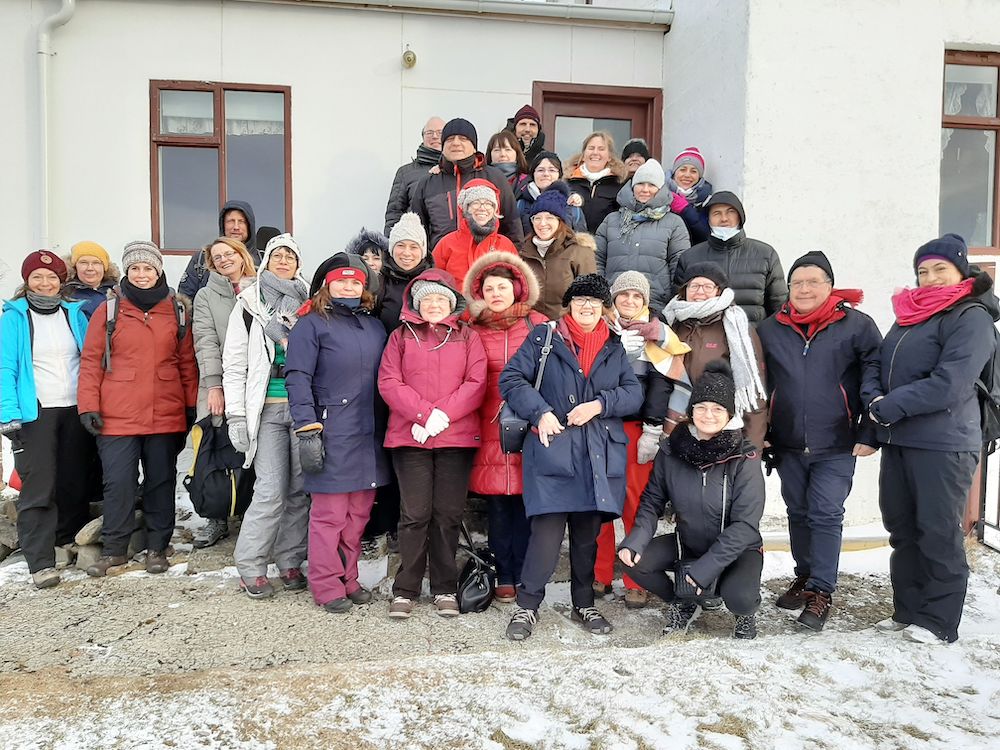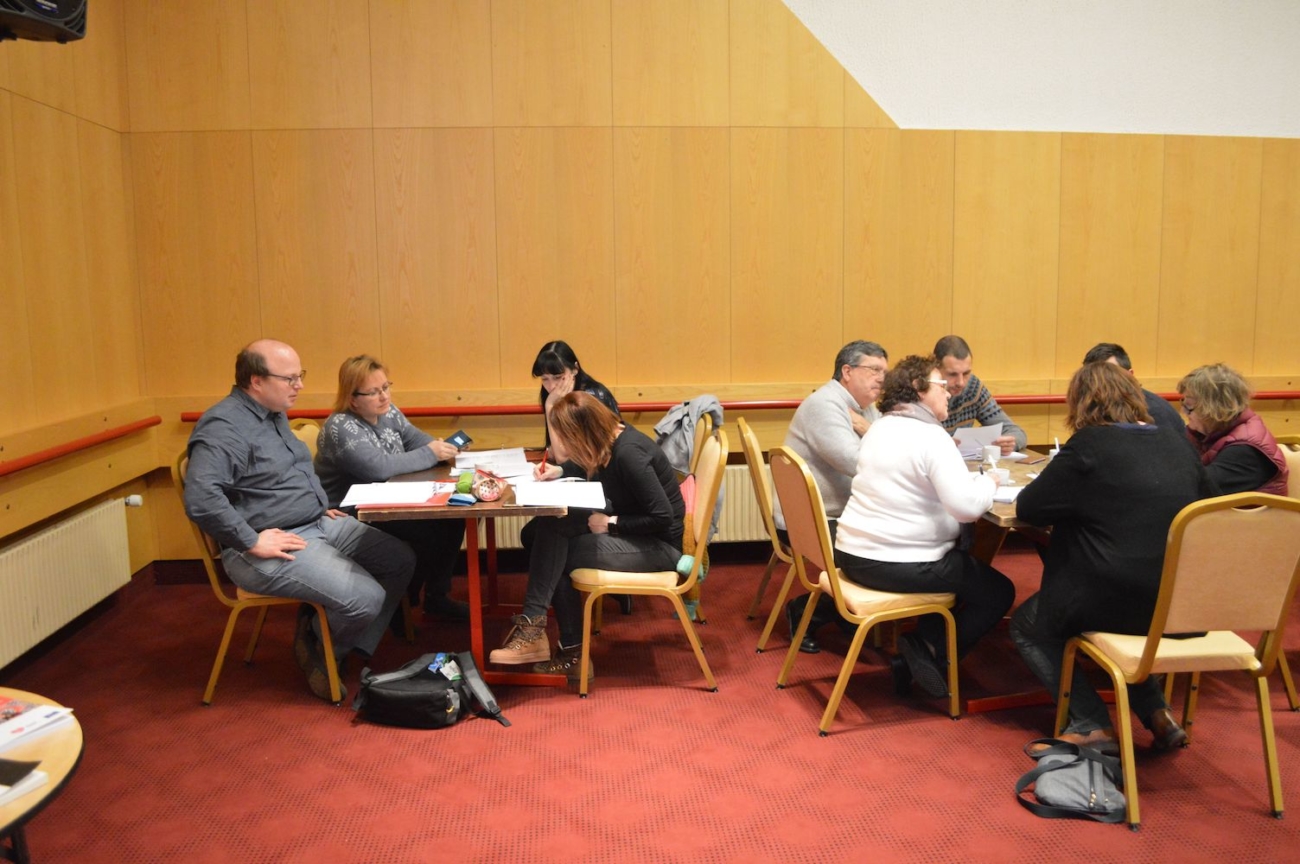Programa Erasmus +
Projeto Europeu – 2019-1-PT01-KA104-060591
Non formal, informal, inclusion – Não formal para a inclusão – NAOFOI
Mobilidade de pessoal ligado à Educação de Adultos
Período de execução: 21 meses
Mobilidades: 15
O Projeto assenta nas seguintes necessidades de formação:
- munir os formadores de ferramentas pedagógicas que lhes permitam criar nos aprendentes adultos uma maior motivação, tendo como objetivos uma melhor integração destes na sociedade e a obtenção de sucesso, a nível pessoal e profissional;
- desenvolver competências linguísticas em Língua Estrangeira, bem como abordar metodologias de ensino/aprendizagem de Línguas aplicadas a aprendentes adultos no sentido da implementação/consolidação deste setor recém iniciado no CACAV;
- desenvolver competências, nos formadores, que lhes permitam responder às necessidades de formação do público-alvo e que estão articuladas com os objetivos gerais estipulados na missão da instituição:
- contribuir para o combate à exclusão de indivíduos socialmente em risco, facultando-lhes o gosto pela sua própria cultura e o respeito por valores culturais diferentes;
- criar o gosto por atividades artísticas que permitam o desenvolvimento de competências pessoais e sociais, de forma a potenciar o exercício da cidadania ativa;
- consciencializar para os valores europeus.
Critérios de seleção:
- ser associado do CACAV e desempenhar funções como formador;
- as funções de formador estarem diretamente relacionadas com uma das áreas de formação abrangidas;
- dominar a língua estrangeira em questão;
- desempenhar um papel ativo na dinamização das atividades culturais do CACAV, na formação de Adultos e além desta;
- ser membro da Direção do CACAV;
- ser responsável por alguma área do Departamento de Formação do CACAV;
- ter disponibilidade para participar nas mobilidades e na replicação da formação frequentada.
1ª Mobilidade – Islândia (3 participantes )
Curso Estruturado: “Sensitisation training with reference to migration, racism, discrimination, culture and diversity with strategies for teaching these issues to diverse age groups”.
Data de Realização: 9 a 15 de fevereiro de 2020

ERASMUS + ICELAND – English Version
Target group:
Target group are schools and other relevant educational organizations which want their teachers/trainers/staff members to be aware and sensitive in relation to stereotypes, prejudice, discrimination, racism and inclusion and to know how to deal with those issues at their workplace or in their classrooms. Additionally they will be schools and organizations who wish to develop sector leading practice in the areas outlined above and have clear aims and strategies to improve their student’s communication competences and intercultural competences by using well structured activities and creative cooperative learning methods.
Preparation:
Participants will be expected to read the course program and pre released reading material.
Aims:
That learners of the educational organization become open minded, critical and active citizens
That learners of the educational organization learn to live and work with others and learn to appreciate diversity in general
That learners are able to access these skills and competences as underpinning aspects of the curriculum
That teachers/trainers/participants become aware and sensitive about issues such as stereotypes, prejudice, discrimination, exclusion/inclusion and racism and everyday racism
That teachers/trainers/participants practice reactions against any kind of discrimination and racism
That teachers/trainers/participants learn how to teach and discuss these issues to different age groups
That teachers/trainers/participants learn how to create a trusting and safe learning environment
Methodology:
The training programme is more practical than theoretical. The training program demands full participation. The main methods will be through cooperative work, various activities, discussions and practical training practices. The lectures will be short and take place between the activities. A key objective is: learning by doing. All participants have to be able to discuss and present activities in English language.
Outcomes:
The outcome of the program will be in the form of sensitized teachers/trainers/participants who can actively master simple cooperative learning methods which train their students social- and intercultural competences. They will have developed lesson plans in order to sensitize their learners on the above-mentioned issues.
Follow up:
On return to their home locations participants will try out the different approaches with their students/pupils/participants and share their experience and material with other participants through e-mail or on an internet platform. The main trainer will also give feedback and counseling after the training session if asked for.
PROGRAM
DAY BY DAY PROGRAM (FROM 9TH –15TH FEBRUARY 2020)
Day one: 9th
Meeting in Reykjavík, bus to Borgarnes, getting together, starting to get to know each other, practical information about the program, group dinner in Borgarnes.
Day two: 10th
How to create a good class climate? Work on constructing the feeling of safety and trust within a group through various activities
Intercultural education in schools and the development of Intercultural education in Europe.
Why is it necessary in European societies to day? Which methods have been useful?
Using one cooperative learning method to learn about the concept of culture
Day three: 11th
Anti prejudice/racist education – Activities as a method to teach about sensitive matters, focusing on teenagers and young adults.
Day four: 12th
Different methods and activities used to teach about stereotypes, discrimination, exclusion, prejudice etc. (Cooperative learning, structured discussions, activities, drama, role-play etc.)
Cooperative learning in multicultural groups. Teachers try out a Cooperative Learning task about social inequalities, migration, discrimination etc.
Myths on migration – cooperative learning task
Day five: 13th
Understanding the concepts; stereotypes, prejudice, discrimination and its consequences
Everyday discrimination. What is it and how does it feel in real life?
Analysing your own environment concerning everyday discrimination
Day six: 14th
Group work on constructive reactions to discrimination and racism
How do we reach a resistant participant or an unmotivated group? Some useful techniques
Participants start working on their own program or teaching plan about the issues above.
Presentation of the lesson plans, feedback
Day seven: 15th
Discussion and evaluation of the training programme. Information and discussion about further cooperation on the Internet where the participants continue sharing their experiences using the methods they have been trying out.
Certification
Day eight: 16th
Departure from Iceland







